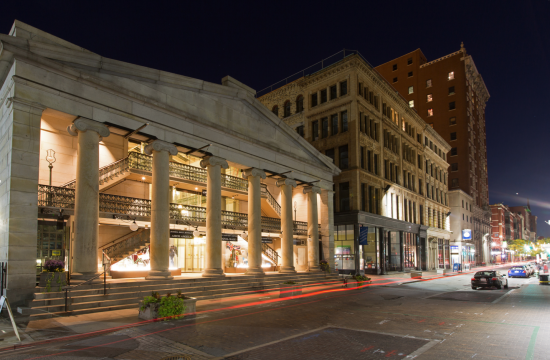
Search Twitter for #mallmonday and see a hilariously bleak photo series that profiles different malls, some dead, some impossibly sad, each week. Why are these depressing spaces so popular with architects? By giving new life to these huge, redundant spaces, architects tap into ruinophilia to feed a culturally ingrained desire for dramatic transformation and also temper the excesses of capitalism, maybe.
In the Texas capital, Austin Community College annexed semi-vacant Highland Mall for a new campus, while NBBJ is reviving a dead mall in downtown Columbus.
In Providence, Rhode Island, Northeast Collaborative Architects (NCA) handily combined dead mall revivification with micro-apartments, for an timely transformation of downtown’s Arcade Providence, the oldest shopping mall in the United States.
The 1828 Greek Revival–style mall was closed for the last three years. Designed by Russell Warren and James Bucklin, the three-story mall was America’s first enclosed shopping arcade. In a $7 million renovation, Providence-based NCA turned the mall, a National Historic Landmark, into a mixed-use development with 17 retail stores on the ground floor and 48 micro-apartments on top. Apartments open out onto a shared walkway, an arrangement that would be penitentiary-chic if not for a skylit atrium.
Unlike micro-apartments in New York, where market-rate rents at Carmel Place range from $2,540 to $2,910 per month, rents at Arcade Providence begin at $550 per month for a 225 to 450 square-foot one-bedroom, My Modern Met reports. (Two- and three-bedroom units are also available.)
Those units come with a full bathroom, kitchenette, and a built-in bed with storage. Tenants have access to shared laundry, TV room, and game room, as well as bike storage, and parking.
Right now, the only catch for prospective tenants is the 4,000 person waiting list.